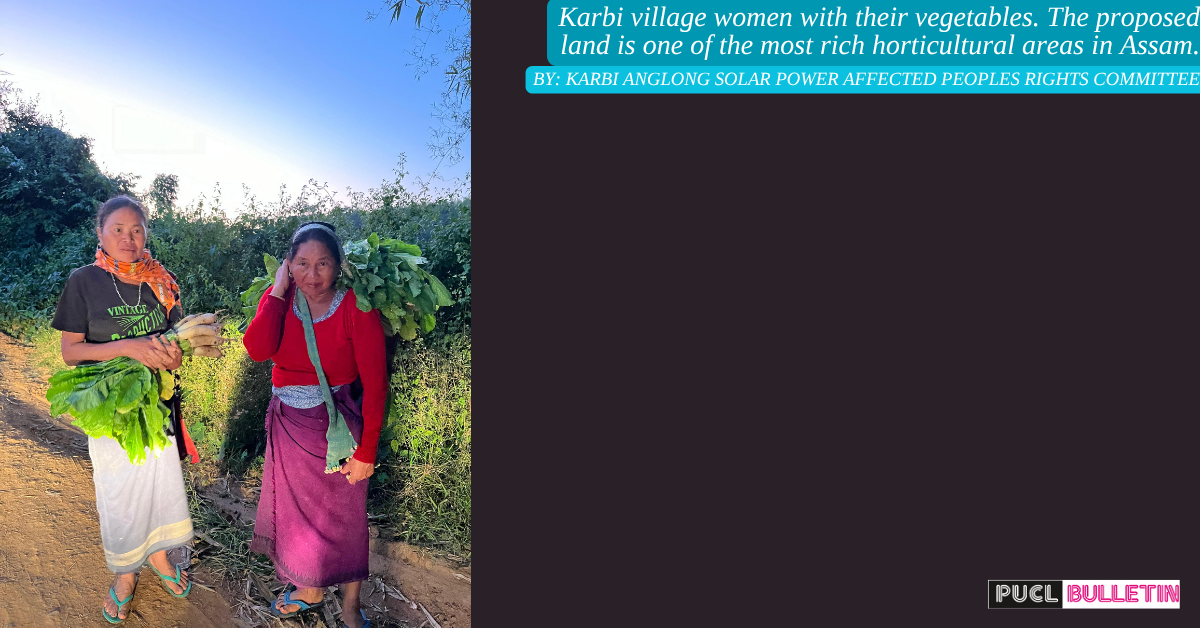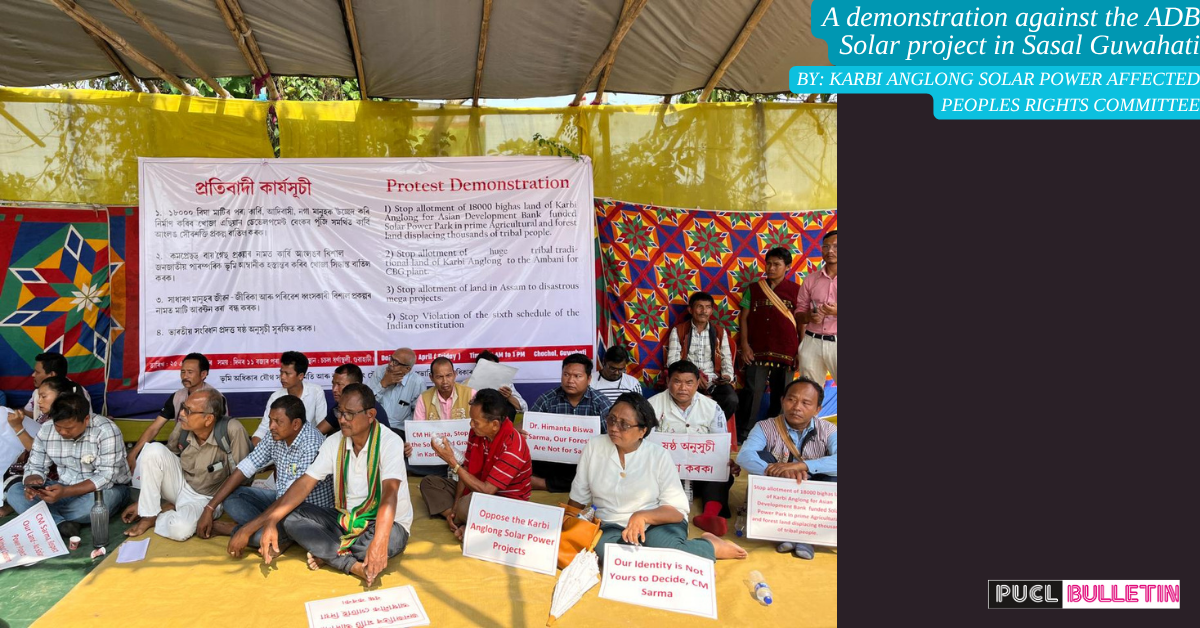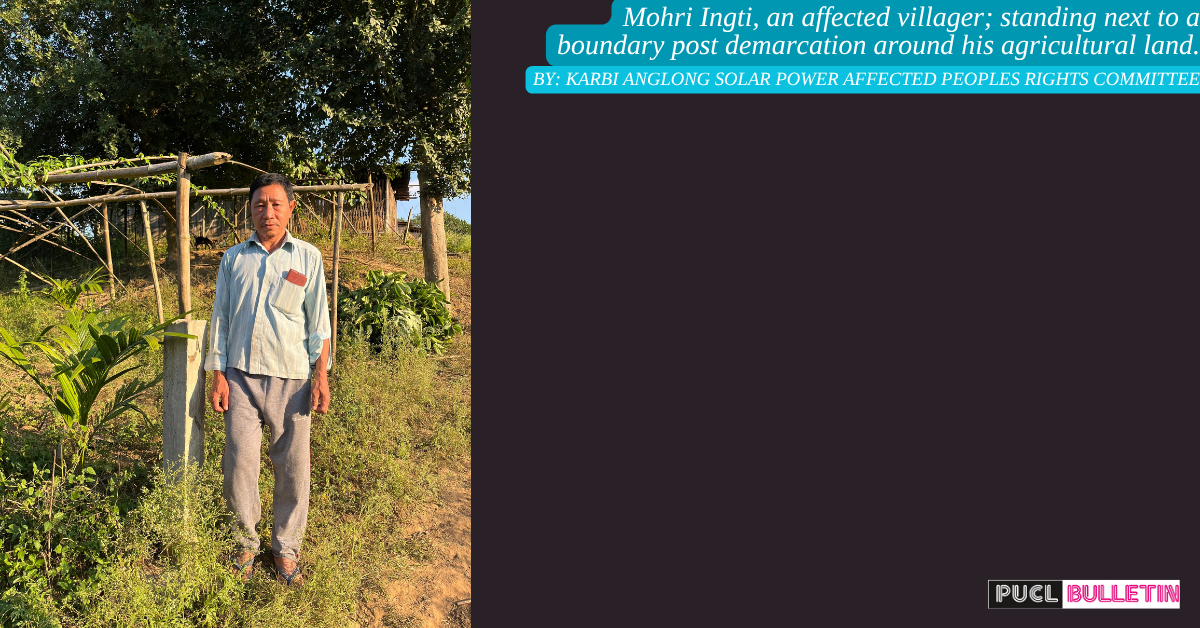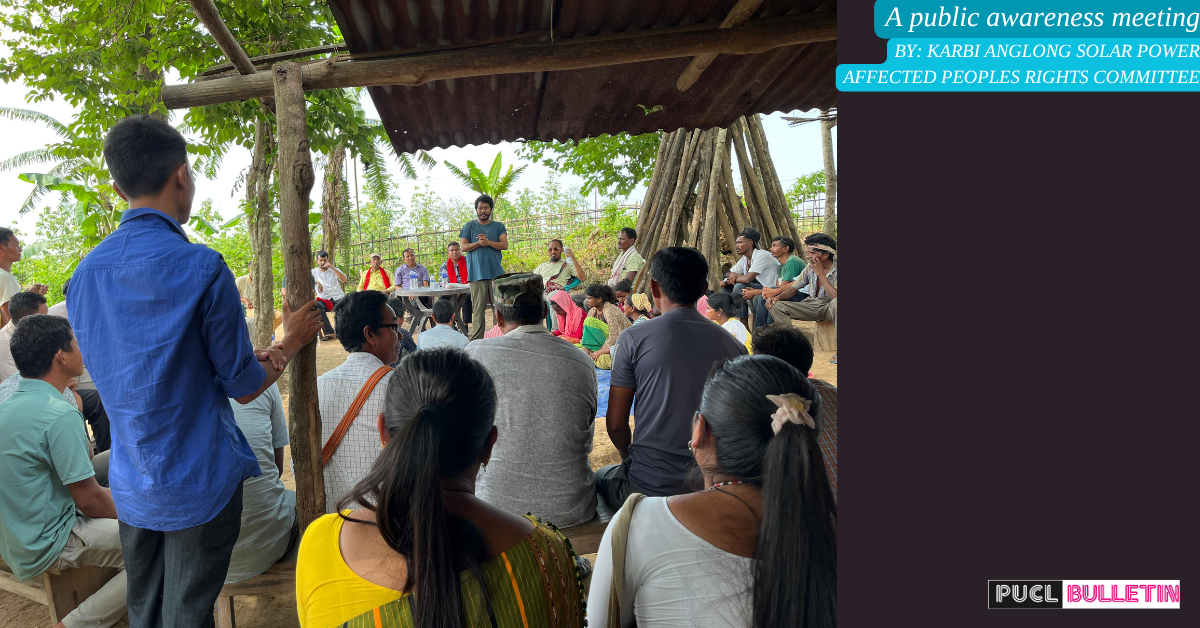The other side of Green/Renewable Energy : Karbi People’s Struggle against a Mega Project

By Pranab Doley
The Climate Change Narrative has brought in major debates for the Renewable/Green energy against fossil fuel globally. The global push is to cut down on emissions of CO2 in-order to keep the warming below 2 degrees as per the Paris agreement of the convention of parties. The climate conventions do have their own justified supporters and critics. The global turn of totalitarian states and corporations leading the way, also has its justified fear from the marginalised states and peoples of the world.
The need for a just energy transition is the call of the hour. But who will determine the Justness of this transition is a challenge for humanity, would justness mean the unheard voices and Marginalised beings both human and non-human and environment as a whole be respected?
Here I (I would be speaking as Spokesperson of the Karbi Anglong Solar Power Project Affected Peoples Rights Committee) would like to zoom in into the aspect of a 1000 MW solar project in Karbi Anglong, Assam, India. However, every story has a background and a quick scrolling down the facts we see.
The Indian government’s ambitious target of achieving 500 GW of renewable energy by 2030 (I.e., 50% power through renewables) is being pushed by setting up Mega solar, Wind, Hydro, Compressed Biogas etc. facilities. The incessant drive for energy to fuel the ever-growing energy intensive development model has hit Assam.

The Assam government’s target to achieve 3000MW of renewable energy by 2030 is being supported by the international finance institution Asian Development Bank (ADB). Solar energy is being majorly pushed through as a part of this target. There have been multiple small and large solar power projects in the state which are being pushed through different state and private entities. Azure Pvt. Ltd is readying 90 MW in Multiple sites across the state, SJVN Green Energy Limited is building a 50 MW, APDCL and Oil India Limited has set up a 25MW plant in Namrup thermal Plant area and many other projects have been underway in different parts of the state. The mega projects of 1000 MW in Karbi Anglong Autonomous Hills District Council and another 1000 MW Project in the Dima Hasao Autonomous Hills District Council are at different stages of implementation.
The Asian development has entered into a Public Private Partnership model solar park financing and technical assistance of a 1000MW Assam Solar Park to be built with the state-owned entities Assam Power Distribution Corporation Ltd., Oil and Natural Gas Corporation Ltd. and Tripura power company Ltd. The private partnership of the project has not been disclosed yet. 50% of the fund which is $435.25 million would be granted as Loan to the Assam Government by the Asian Development Bank and another 25% would be invested by the state entities and the rest would be Privately invested.
The Assam Solar Project to be set up in Karbi Anglong, Assam would be acquiring a vast land mass of 18,000 Bighas of land in the East Karbi Anglong area. This land would be taken up to build a multi-tranche public private partnership model solar power park.
Karbi Anglong Autonomous Council: People’s voices
Special status has been given to the Karbi Indigenous peoples under the sixth schedule of the Indian Constitution in 1951. The status of a scheduled area is accorded to protect the indigenous people and their way of life. However, the Karbi Anglong Autonomous council has been plundered of its resources and its peoples for generation. The Karbi Anglong people still continue their struggle for their self-preservation in their own right over their culture, their land and their future.

We walk together with the 24 villages (more than 20,000 individuals) that would be directly impacted by the Solar project, the resistance to the mega project started in 2023. A well-crafted petition to the Deputy Commissioner and the implementing agencies read out in detail about how the project is a complete takeover of their land and is nothing different than a colonial takeover completely ignoring the people’s rights to their own land and Heritage. Numerous representations have been made to all the concerned authorities, constant meetings have been held among the people, large demonstrations and protest rallies have been undertaken.
‘This is the land of our ancestors, and we have received Ramhoks (pattas as per the traditional laws) granted to us by the Rong Asars (village Headmen) of our Sar Van Keps (village council)’ spoke a Karbi elder, John Ingti Kathar, a retired Bureaucrat and Political Leader, in one of the joint protests in Diphu the district headquarters. The autonomous council and the sixth schedule were designed to give judicial legitimacy to the traditional administrative and socio-political bodies of the indigenous peoples.

‘We have been here since times immemorial, and our ancestors have built this space, and we continue to protect the land and the forest rivers and the hills for our future generations’ says Riso, one of the traditional heads of a village. Another says, ‘It’s not only our home but also home to our deities and also the wild animals of the forest, the elephants and other animals too live here in this land’.
Anita Mech, another farmer from the area reiterates that ‘the productivity of the land, its rich not only in rice but also the major horticultural area and sending huge produce to the nearby markets of Dimapur and Diphu. This agriculture and forest produce not only sustains the local villagers but also hundreds of tenant agricultural families in the area.’
Laws bypassed, empty process of granting approvals
All the above realities are bartered into a narrative in the documents produced in the format of legal procedures by the Local Authorities and submitted for clearance of the project in Indigenous territory. The national laws applicable here have been bypassed without the need to do any form of free and prior informed consent (FPIC) or public hearing procedures with respect to an Environment Impact Assessment or Social Impact Assessment as per the environmental or land laws and under the constitution. The Indian government has exempted solar power projects from the requirement of environmental clearance as per the existing laws.
The Local council administration here has played into the hands of the big capital and the state government bringing into question the existing power of the sixth schedule. The colonial narrative of degraded or waste land is reintroduced to snatch away land and forests of the indigenous communities.
The ADB as an international Multi Government Entity has its own process and by definition they follow the process of Environmental and Social Standards requirements primarily when it comes to indigenous territories and the impacts on which require FPIC. In this scenario there have been allegations of coercion of and non-consultation with the originally affected villagers.

Here the people in their villages spend sleepless nights wondering what their fate would be. Will the only home they knew be taken away from them with the batons of the state, paving the way for private entities to garner profit out of their lands. Should the indigenous still live to harness the earth or are they mere disposables in the idea of a not so just transition. However, this debate is to be continued until we all as a collective humanity find our way through to redemption or doom.
Pranab Doley is a political activist from Assam and Spokesperson, Karbi Anglong Solar Power Affected Peoples Rights Committee.
Postscript:
In the latest update, the ADB has withdrawn a $434.25 million loan to the proposed 1000 MW Solar Park in Karbi Anglong Autonomous Council in Assam, on request from the Union finance ministry following strong opposition to the project by the local communities. While the struggle of the Karbi Anglong people for cancellation of the project continues, this is a big victory in their fight to protect their rights, and also for the indigenous peoples struggles and environment movement in the country.